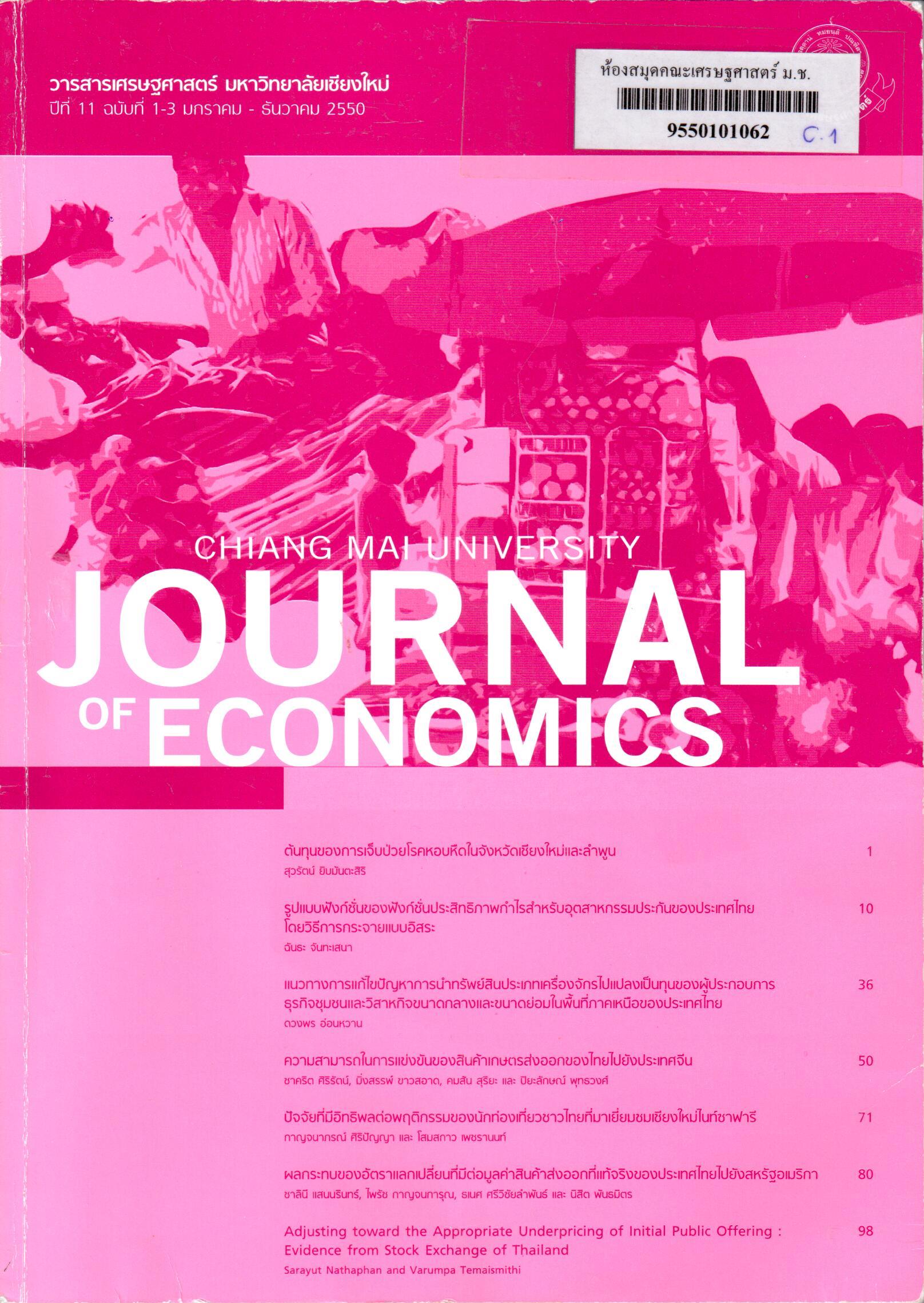แนวทางการแก้ไขปัญหาการนำทรัพย์สินประเภทเครื่องจักรไปแปลงเป็นทุนของผู้ประกอบการธุรกิจชุมชนและวิสาหกิจขนาดกลางและขนาดย่อมในพื้นที่ภาคเหนือของประเทศไทย
Abstract
บทคัดย่อ
การวิจัยครั้งนี้เป็นการวิจัยเชิงสำรวจ มีวัตถุประสงค์ 2 ข้อคือ หนึ่งเพื่อศึกษาปัจจัยปัญหาอุปสรรคที่มีผลต่อการนำทรัพย์สินประเภทเครื่องจักรไปแปลงเป็นทุนของผู้ประกอบการธุรกิจชุมชนและวิสาหกิจขนาดกลางและขนาดย่อมในพื้นที่ภาคเหนือของประเทศไทย และสองเพื่อศึกษาหาแนวทางในการแก้ไขปัญหาการนำสินทรัพย์ประเภทเครื่องจักรไปแปลงเป็นทุนของผู้ประกอบการธุรกิจชุมชนและวิสาหกิจขนาดกลางและขนาดย่อมในพื้นที่ภาคเหนือของประเทศไทย โดยสุ่มเลือกจังหวัดตัวแทน 6 จังหวัดในภาคเหนือ เครื่องมือที่ใช้เป็นแบบสอบถาม ชุดที่ 1 เก็บข้อมูลจากผู้ประกอบการที่เป็นตัวแทนรวม 1,224 ราย ชุดที่ 2, 3 และ 4 เก็บข้อมูลในจังหวัดที่เป็นตัวแทนจากผู้เกี่ยวข้องในอุตสาหกรรมจังหวัด, สถาบันการเงินที่เกี่ยวข้อง และเจ้าหน้าที่สรรพากรตามลำดับ หลังจากเก็บข้อมูลโดยแบบสอบถามแล้วได้จัดสนทนากลุ่มย่อย และการประชุมเสนอนำเสนอ ผลการวิจัยเพื่อรับฟังประชาพิจารณ์จากตัวแทนผู้ที่เกี่ยวข้องเพื่อตรวจสอบและยืนยันข้อมูลที่ได้จากการสำรวจ ผลวิจัยพบว่า ผู้ประกอบการจำนวนประมาณร้อยละ 86 ของกลุ่มตัวอย่าง เป็นผู้ประกอบการที่มีสินทรัพย์รวม (ไม่รวมที่ดิน) ไม่เกิน 1 ล้านบาท ซึ่งในที่นี้จะเรียกว่า "ผู้ประกอบการธุรกิจที่เป็นระดับรากหญ้า" ได้รับความรู้ข่าวสารเกี่ยวกับโครงการยังไม่ทั่วถึงและขาดรายละเอียดที่สำคัญจนทำให้เกิดความเข้าใจผิดคิดว่ามีเครื่องจักรจักรแล้วสามารถขอสินเชื่อได้ทันที ผู้ประกอบการธุรกิจที่เป็นระดับรากหญ้าร้อยละ 51.62 ของผู้ตอบคำถาม ไม่พึงประสงค์จดทะเบียนเครื่องจักร เพราะไม่ต้องการเปิดเผยสถานะของตนและเกรงจะมีภาระความรับผิดชอบเพิ่มขึ้นตามมาตรการควบคุมดูแลตาม พ.ร.บ.โรงงาน เมื่อไปขอสินเชื่อจากสถาบันการเงินหลังจดทะเบียนเครื่องจักรแล้วพบปัญหาในด้านต่างๆ ได้แก่ มีคุณสมบัติไม่ครบตามเกณฑ์พิจารณา ขาดการเตรียมเอกสารในการขอสินเชื่อ ขั้นตอนการอนุมัติสินเชื่อไม่ทันต่อความต้องการ สถาบันการเงินไม่ยินยอมให้ใช้เครื่องจักรเป็นหลักประกันสินเชื่อเพียงอย่างเดียว และคณะกรรมการระงับข้อพิพาทนอกศาลไม่มีอำนาจบังคับตามกฎหมาย
แนวทางการแก้ไขปัญหาตามโครงการแปลงสินทรัพย์ประเภทเครื่องจักรเป็นทุนของกลุ่มผู้ประกอบการธุรกิจที่เป็นระดับรากหญ้า เป็นมาตรการระยะยาว เพื่อกระตุ้นให้ผู้ประกอบการธุรกิจที่เป็นระดับรากหญ้าที่มีเครื่องจักรในการประกอบธุรกิจจดทะเบียนเป็นเครื่องจักรเพิ่มมากขึ้น
Abstract
A study was conducted by the Survey Research Method, of which, its purposes are (1) to study obstacle factors on utilizing the machine capitalization program which is being operated by the entrepreneurs from community businesses and entrepreneurs from SMEs in Northern of Thailand, (2) to study and find out any measures for solving the problems on machine capitalization program which is being operated by the entrepreneurs from community businesses and entrepreneurs from SMEs in the northern of Thailand.
The research based on 6 selective sampling provinces in North. The primary data was collected by answering questionnaires, Set 1 from 1,224 no. of representatives from entrepreneurs; Set 2, 3 and 4 from the representatives of selected provinces including related officers from the Office of Provincial Industry, Provincial Financial institutes and Provincial Revenue Department respectively. After collecting the questionnaires, a Focus Group discussion and Public Hearings were organized with the related representatives in order to verify and certify the collected data from the survey.
According to the research results, 86% of samples were the small entrepreneurs, hereinafter called “the grass root level entrepreneurs’, including the owners of a community enterprise and a small enterprise whose total value of properties (excluding land) are not over 1 million baht. Some problems was found out from the study as follows: (1. Information on the machine capitalization program has not been publicized widely in particular to the small enterprises and, substantially, its details are so limited that misleads of having machine being able to apply for loan per se. (2. 51.62% of the grass root level entrepreneurs who answer this question do not want to have their machines registered as from their points views, it would be rather burden to disclose an operation status and to be obliged to rules and regulations of Factory Act than any advantages acquiring from the machines registration. (3. After machine registration, they encounter some problems on loan application towards the operation of financial institutes as follows; (i) Personal qualifications as well as business performance of the entrepreneurs do not meet the bank criteria. (ii) Incompletion of loan application documents (iii) Unsatisfactory with the long period of loan approval according to the screening process of credit verification and machine valuation. (iv) Some physical characteristics of the small machine are insecure for the bank to accept it as collateral as well as difficult to enter an action in Court when default occurs.
In relation to problem solving directions following machine capitalization procedure of the grass root level entrepreneurs, it was recommended as along term measure to enable increasing in a number of registered machines.
Downloads
Issue
Section
License
All opinions and contents in the CMJE are the responsibility of the author(s). Chiang Mai University Journal of Economics reserves the copyright for all published materials. Papers may not be reproduced in any form without the written permission from Chiang Mai University Journal of Economics.






